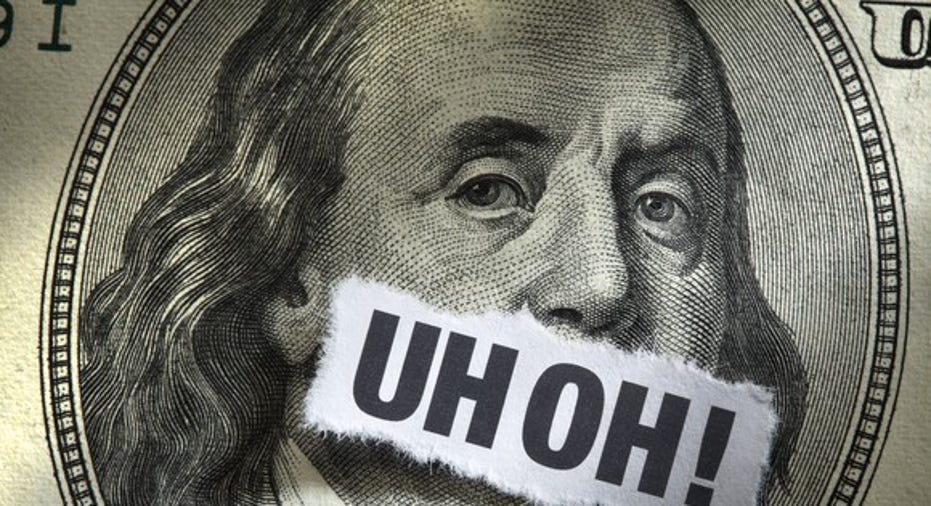28% of Americans Are Making This Avoidable Retirement Mistake

Saving for retirement is hard enough without shooting yourself in the foot.
Unfortunately, over a quarter of Americans are doing just that.
Image source: Getty Images.
According to the Natixis 2016 Retirement Plan Participant Study, 28% of Americans have taken a withdrawal from their workplace retirement plan -- usually a 401(k).
That's a big mistake. Here's why.
Tallying up the damage
One of the key benefits of defined-contribution plans like 401(k)s is their favorable tax treatment. When you defer part of your income into a traditional 401(k), that money is subtracted from your taxable income, thereby giving you a nice tax break as a thank-you from Uncle Sam for saving toward retirement. If you withdraw that money before retirement, under most circumstances you'll be taxed at your current bracket as if the amount of your withdrawal were additional income -- and you'll usually pay a 10% early withdrawal penalty as well. That's a big bite out of your retirement savings.
Don't forget the lost time and compounding, either. Let's say you withdrew $10,000 from your 401(k) at the age of 25. That's money that would have been left there to compound until age 65, at a 7% annual return (which is reasonable, given historical market returns). You'd be missing out on an extra $149,744 in retirement savings -- $10,000 in principal and $139,744 in stock market gains.
Once you've gone to the trouble to save the money in a tax-advantaged account, it's generally best not to withdraw it.
Here's why people do it anyway
There are a number of reasons cited in the Natixis survey for why people chose to take an early withdrawal from their 401(k). The most common reason was "financial hardship," followed by "healthcare," to "pay down debt," "home repairs/maintenance", and "medical emergency."
Many of those issues are short-term financial shocks -- particularly financial hardship and medical emergencies. While Americans are advised to have an emergency fund (usually six months' worth of expenses) set aside for such issues, we know that most households can't immediately come up with $1,000 without resorting to debt or selling investments. So it isn't surprising that people are having to raid their 401(k)s.
Get ahead of the problem
The answer, then, is to build up a short-term savings cushion. That work starts with you figuring out how much you need to save. How much are your nondiscretionary expenses each month? (Think mortgage/rent, utilities, insurance, other debt service like car payments, and food.) Take that number and multiply by six to get six months' worth. That's your savings goal. If you already have some money set aside toward that, awesome!
Next, how to get there. You have to figure out which expenses you can forgo while you build up your savings. Maybe it's eating out one less day per week, or bringing your lunch to work every day. Perhaps it's deferring a couple of big purchases (my wife held off on buying a nice camera until our finances were stabilized a few years back). Or it could be cutting out the gym membership you aren't using, or drinking the crappy office coffee instead of going to the nice cafe down the street, or...you get the idea. (Also, as my colleague Maurie Backman noted, there are some bigger things you can optimize instead of your daily routine.)
Once you've identified those, it's time to start saving. The easiest way to do this is to treat your savings account like a 401(k): Have your employer automatically deposit some of each paycheck to a savings account for you.That means you won't see the money, and you won't be tempted to spend it. Instead, it'll grow quietly in the corner -- and your margin of safety will grow with it.
Retirement is serious business. Don't leave yourself overstretched to the point that you might risk it because of a short-term financial emergency. Protect yourself so you have the extra cash handy to deal with problems as they arise.
The $15,834 Social Security bonus most retirees completely overlook If you're like most Americans, you're a few years (or more) behind on your retirement savings. But a handful of little-known "Social Security secrets" could help ensure a boost in your retirement income. For example: one easy trick could pay you as much as $15,834 more... each year! Once you learn how to maximize your Social Security benefits, we think you could retire confidently with the peace of mind we're all after.Simply click here to discover how to learn more about these strategies.
Try any of our Foolish newsletter services free for 30 days. We Fools may not all hold the same opinions, but we all believe that considering a diverse range of insights makes us better investors. The Motley Fool has a disclosure policy.



















